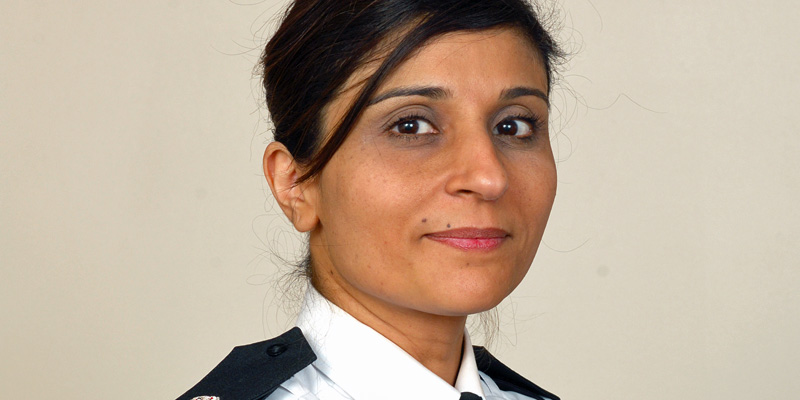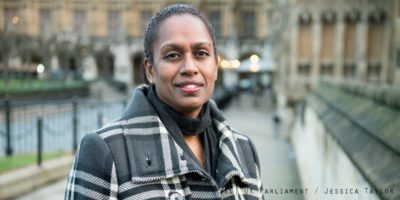Superintendent Rai joined the Thames Valley Police in 1992 and she has worked in a variety of uniform and investigative operational roles, mainly in the Berkshire and Buckinghamshire areas. In October 2015 she took on the role of LPA Commander for the Royal Borough of Windsor and Maidenhead, following just over a year as the Detective Chief Inspector for Force CID across Berkshire. Prior to this she was the Deputy Commander at the neighbouring local police area of Chiltern and South Buckinghamshire.

“…I go home every day thinking I did a really good thing and actually feeling like I am living my life in a way that helps me to discharge not just my legal duty as a police officer, but my moral duty as a citizen of the communities that I police…”
Banking on a career change
I applied to join the police in 1991 when I was 21 years old. Before that, I was quite happy working for NatWest but I wanted a new challenge and the opportunity came up and so I said I would give it a go.
I always wanted to do something justice related, but I was not sure exactly what. I am not one of those people who can say since I was very little I always wanted to be a police officer because I never even considered it. It was never even on my radar until a leaflet dropped through my door. Even then it was not necessarily something that I had previously thought that I would be able to do.
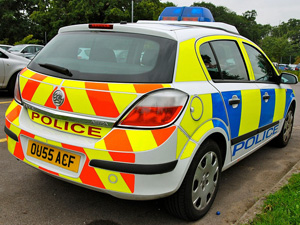
I found that quite hard because I come from a quite traditional background. I had not spent much time away from home without either my family, and then after being married without my husband. There were very few non-white faces. I think out of 300 there were 3. That was quite a change from what I was used to.
Protecting people who cannot protect themselves
I loved the actual policing. I enjoyed interacting with people and I liked the fact that every night I could come home and think: “I did something that was good today and it aligned with my own moral standing.”
My father used to say: “Somebody who commits a sin is clearly a sinner but the person who stands by and lets that sin be committed is an even bigger sinner.” It is our job to intervene and to protect people who cannot protect themselves, and that is part and parcel of what my upbringing has been. My job has allowed me to do that every single day. For this reason, I knew this was a career for me from the first years of being in the job.
Career progression
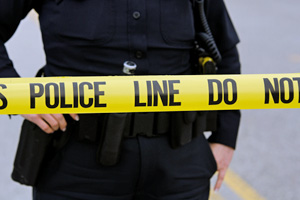
He was very forward thinking for his time, understanding how confidence of all communities helps policing across the board, and he encouraged me to go for the sergeant’s exam. I did the exam and he said I should apply for promotion. I said I was never going to get promotion – I had little kids so how was I going to manage that? But he was very supportive and helped me to understand how I could manage.
That was the start of my progression in policing and I have not looked back since.
I then became an inspector. I worked on policing in various parts of the force. I did some strategic work at headquarters around closing the gap in our services, things like contingency planning and major crime, and what we would now call our strategic requirements. After that I got promoted to become a chief inspector.
I was a Deputy Commander for South Buckinghamshire and then from there I became the Detective Chief Inspector for Berkshire for serious crime. I then applied for a promotion to become a superintendent. I passed and I got the role I now have which is the Local Police Commander for the Royal Borough of Windsor and Maidenhead.
No two days the same in 26 years
Every day is very, very different. I do not know any two days in 26 years that have been the same. My day starts very early. Some of that is out of choice and some of that is because I want to provide the best service that I can – my own idea of public service. I normally start work before 7 o’clock.
Between half six and seven and I check the last 24 hours’ worth of crime and reports and phone calls in my police area. I cover Windsor and Maidenhead, so I have a look to see what has happened, see who is calling us, what sort of things they are calling us about and make sure that I am prepared for the day ahead.
At 8.30am I then hold a daily management meeting where I have all my key individuals – my detective inspector, my neighbourhood inspectors, my performance inspectors and my serious crime managers. My first couple of hours is spent making sure that all the incidents that have come in are being dealt with properly and have the right level of resource.
If there is anything that I feel unhappy about, I will ask people to report back later to let me know how it has gone. If there is anything I think requires extra resource I arrange it.
This is how we prioritise for the day. Part and parcel of that is also setting the culture for how we police and I do that all day, every day, but that morning meeting with everybody around the table is a really good place to set the expectations around protecting vulnerable people.
The role of a superintendent
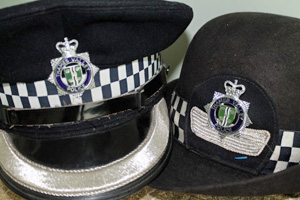
As the day progresses, I usually have various meetings relating to the different roles that I play. Sometimes I have operational cover – I do that for the whole of Berkshire and that will mean that anything that requires a superintendent’s authority in legal terms.
I consider things from across the county like extending the time people could be held in detention without charge. It can also be things like authority to gain information. There is a law around how we get information from people’s phones and computers and whether or not that it is appropriate to do so, unlawful to do so. I authorise those sorts of things.
Smarter working
When I do operational cover for Berkshire it is for a period of time. It would be challenging for me to be at work for that full 24-hour period, so with the technology and the way things have evolved I can do that role from pretty much anywhere. Other than things that legally require me to be face to face with somebody, I can do everything else remotely.
When I talk about having a force wide role, whilst I will have to deal with things in geographically a huge area, this does not actually mean I have to travel to every single bit of the area all the time. I can do a lot of that remotely.
So, remote working and the whole smarter way of working is becoming more and more important, not just because it helps flexibility, but also because it is the most cost-effective way of policing. It is a win / win with the changes in technology. If I had one plea I would want access to these resources quicker, but clearly we can only go with what our budgets will allow us to do.
Partners and critical friends
I spend a lot of time talking to various partners – the locality authority, the health trust, social care – all across the board. There are quite a few charitable organisations we work with as well as members of the public. I have an independent advisory group made up of representatives from groups such those with disabilities, both physical and mental. We also have representatives on there from groups such as the Autism Society.
We have a varied range of people who act as ‘critical friends’. If I am planning to introduce something new I may to speak to them to get an overall view about how my public and my community is likely to react, and what sort of things are likely to be important to them.
Another thing I do is to keep an eye on how well we are performing against the various different priorities that we have set by the Police and Crime Commissioner, as well as by our chief constable.
Not like The Bill
Sometimes it can be like what you see on television, but not always. Not very many things get solved within half an hour, like they used to do on The Bill. Some of the fly on the wall type documentaries can be quite similar though.
You can go through days where things are quieter, but you can go through days when you blink and you think: “How is it is now 7 o’clock in the evening? I have been here for 12½ hours and I have not managed to do anything that I was going to do because something else has come up that I have needed to deal with.”

We always have new challenges, but there’s also some nice stuff. (People think that the Police only deal with difficult and challenging things but we have some lovely things too.) One of the great things we have got at the moment is the Royal Wedding in May. It is such privilege to be part of the planning around that because it is such a great event.
Changes in policing
I think that policing has become much more open and police forces have become much more caring and learning organisations. Some of the lessons we have had to learn have made us look at ourselves, our processes, our culture, how we think and how we understand the complexities of life now compared to life 30 or 40 years ago.
Technology has changed things – the global footprint of policing touches everybody now. You might have no idea who a person is, but you could be interacting with them using technology and they could be committing all sorts of crimes, so there is a massive change in the policing environment and the way in which our communities engage with each other and with us.
The public rightfully expect us to behave without reproach and sometimes when things have not gone well in the past we have had to learn from that. All of that has changed policing.
The other thing that has changed in policing is that we are already more diverse. We certainly have more women in policing than we had when I first joined but I think we have made very little progress on black and Asian minority groups. I don’t think we’ve reached a tipping point yet.
We are starting to get many more women into the organisation but more work needs to be done around gender. This includes making sure that there is a representation across the ranks and across the bands so that they are not all concentrated at constable level or the lower band level. There is more work that we can do to ensure that progress happens in the way that it should.
Diversity and inclusion: More than just ‘nice to do’
For me, a lot of people think diversity is nice to do – that it is ‘nice’ to have a diverse police service because the public like people who are like them. I do not think this is a ‘nice to do’ and it is not something about wanting the public to like us. I think this is a business case. If I was a business person I would be thinking actually: “How safe are the people that I am charged to look after? What else can I do to make them safer?”
The way it works is, if you are born, bought up, you live day in day out in a particular culture in a particular type of society, in a particular neighbourhood and with a particular kind of traditions, cultures and upbringing in a way that it is instilled in you, it becomes part of your subconscious and when you are policing, your subconscious plays a role in that.
When you are in a different community, you are more likely to pick up the very slightest indications that something is not quite right or something is a bit different to what it should be or whether it feels right. It is more difficult to learn that than when it is part and parcel of your upbringing, part and parcel of your make up.
If you have got that, you are always more likely to pick up when things are not great or somebody is not happy with something, or that something is not working very well. People perceive that you are more likely to understand their point of view as well because – particularly from minority communities – they are more likely to think that you will understand their culture, their traditions, why they do things in the way that they do, what that means to them, how important it is.
To understand why people would do some of the things that end up happening with honour-based abuse and FGM you need to be able to have a very good understanding of the communities where they take place. If you are born and brought up in those communities I think that helps for people to trust you. It helps people to give you information.
Building trust in the community
If people are prepared to give you information and tell you what is going on, you are more likely to understand what crimes are being committed, and what people are saying about who they think are committing those crimes. Once you have that intelligence you have got a starting point. You can then start to go and gather evidence.

That in turn increases confidences in all of our communities and if it keeps going around, that circle of increasing that confidence, you are much more likely to be able to make our communities safer. That is why I think it is vital to have diverse police force.
Additional challenges of being part of not one, but two minority groups
I think ‘interesting’ is the only word I can use to describe being a BAME woman in the police. Being part of more than one minority group, I do sometimes question whether I feel the way I feel about how something happened because I am a woman or because I am of a minority background. I look different for both reasons. It is quite often that I can be in a room at my rank and be the only woman, but it is more often that I am the only non-white person in the room.
More women in senior positions
I think there is much more support gender wise because there are greater numbers of women, not just among police officers, but also police staff. We have quite a lot of police staff in senior positions who are women in Thames Valley and I’m incredibly proud of that. One of the reasons for that, in my belief, is you can come in at any level as police staff – you do not have to start at the bottom and work your way up. You can get your experience in things like HR, recruitment, admin, finance by working your way up in other companies and actually just directly come in at a higher level into policing.
As for police officers, up until very recently everybody started as a police constable, so it takes time to get to any of the ranks above that and particularly to get to the ranks where the level of influence is so much greater on how the force works and that kind of culture change. I think there is some work to do around how do we get that to happen better than it happens now.
The importance of connections
With policing, there is something around networking and truly understanding what it is – having the kind of connections in the right places to be able to know what is going on so that you are well prepared. We need to savvier about how we do that mentoring and coaching part of the business when it comes to women.
There is something about mentoring and race because sometimes there can be quite challenging conversations because of how people might feel. I think there is more work to do both on the gender side of things and on the BAME agenda as well around progression in particular.
BAME retention needs improvement. Lots of people still leave. I describe it as a sink where we have the tap open, but we never quite seem to be able to put the plug in the hole. Our percentage never seems to go up. We have been about 5% for the 26 years that I have been in policing.
Feeling comfortable in order to be successful
I do not think there has ever been any detailed research to say why but we can surmise and I think the very basic thing that what people need at any place of work where they are going to be successful is to feel comfortable.
They need to feel like they have the opportunity and the chances to fulfil their potential. They need to be able to see role models to be able to say actually, this can be done. The glass ceiling is not so low, but it can be broken through and I would love to be a time where it doesn’t exist either for women or for BAME people.
Without all of those things, it can be quite a challenging career to keep on trying with. If you feel that you do not necessarily belong, that your chances of success are limited and, especially in comparison to other places then you are less likely to join and then stay.
Vast variety of roles
I haven’t worked in many different organisations but I cannot imagine other places where the variety of what you can do is so vast. You have got constables, where you are policing on response, your blues and twos, responding to the 999 calls. You have got investigative roles where you are searching around to find out what really happened. How am I going to get the right evidence? Do I understand what is actually going on here?

There are so many things that you can do all within the same career and then you can do them at one rank and then move across to another rank, and move across to another rank and see it all from a different point of view. I think it is probably the most diverse organisation that people can work for when it comes to roles. For police staff roles, yes you can move around but there are particular specialisms – if you were HR expert and you were to go into finance you probably would need to have some finance background.
Advice for other BAME girls and women who are interested in joining the police
My advice to BAME girls and women considering careers in the police would be: “Absolutely – go for it.” I learnt so much, not just about the world around me, but also about the people that I police and how communities work, how people work and how people think.
I have grown up so much. I am not afraid to say that I was actually quite naïve when I joined the police. My view of how the world worked was formed in a very cocooned environment and coming out into an environment where you see all the good and all the bad – people in crisis and people in elation – makes the experience of life amazing.
On top of that, I go home every day thinking I did a really good thing and actually feeling like I am living my life in a way that helps me to discharge not just my legal duty as a police officer, but my moral duty as a citizen of the communities that I police, and to my country as well. I would question how many other places could say they are able to provide that job satisfaction every single day.
I’d like to make a plea to communities, and not just young people, but to those people who have had successful careers and are thinking whether they want something different at some point in their life, because we have direct entry now.
Direct entry is an extremely positive way of bringing change in at different levels and I would encourage people, not just to think about joining as a constable. You can have influence more quickly by joining as an inspector or superintendent. That makes a difference to those people who are straight out of university or looking to change careers.
I would also say that it is never too late and I would be surprised if anyone was to regret choosing a career in the police.
Coming up next

Coming up for Thames Valley Police, we’ve got the Royal Wedding. We are very excited and looking forward to it. Clearly, it brings its own policing challenges, but it is about a good day, for not just the couple, but also all those people who are joining in the celebrations. It is very interesting thing to be involved in, and not something that anyone would make a natural assumption they would become involved in, even in policing Windsor.
For me personally, I am actually changing roles shortly so I will be leaving the Command of Windsor and Maidenhead. I have been asked if I would be happy to take on a role of a detective superintendent at force level, looking after all three counties, Oxfordshire, Buckinghamshire and Berkshire for force CID – serious crime.
I will be in a very different role as to the commander of a geographic area. My staff will be across the whole force, all the way from Milton Keynes down to Slough, so quite a big remit and a different view point on policing. I’m really looking forward to taking on this new challenge.
https://www.thamesvalley.police.uk/
https://twitter.com/bhupinderrai70
Meghan Markle and Prince Harry image credit – By Mark Jones [CC BY 2.0 (http://creativecommons.org/licenses/by/2.0)], via Wikimedia Commons
St George’s Chapel, Windsor image credit – By Aurelien Guichard from London, United Kingdom (Windsor Uploaded by BaldBoris) [CC BY-SA 2.0 (https://creativecommons.org/licenses/by-sa/2.0)], via Wikimedia Commons

